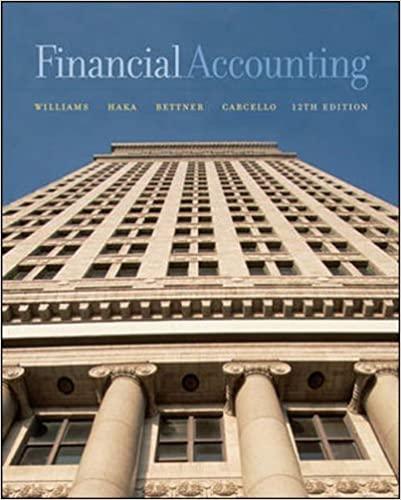Answered step by step
Verified Expert Solution
Question
1 Approved Answer
Joan Holtz (A) was cre. Chapter 5 Revenue and Monetary se 135 cost of 00.00 was ap- actually received by the farm from the grain
Joan Holtz (A)

was cre. Chapter 5 Revenue and Monetary se 135 cost of 00.00 was ap- actually received by the farm from the grain clevator operator. Full collection often took several months be- cause a grain elevator operator might keep wheat for a considerable time in the hope that prices would rise so the elevator company could sell at a higher price than that paid the farmer. Questions (Hint: Under the collection method, accounts re- ceivable are zero. Under the production method, ending inventory is zero. Under all three methods, assume beginning retained earnings are zero) 2. Assume that the Grennell Farm had received a firm offer of S225,000 for 100 acres of the farm that would be used as the site of a new housing devel- opment. This development would have no effect on the use of the remaining acreage as a farm, and Ms. Grey planned to accept it. How would you ac- count in the 2009 financial statements for the eco- nomic gain represented by this appreciation in land values? 3. Should Ms. Grey retain ownership of the farm? wable to 1. Prepare the 2009 income statement and the related ending balance sheet for the Grennell Farm recog- nizing revenue by the a. Sales (delivery method). b. Collection method. c. Production method. s an addi was no that Jere- earnings in lifestyle to Case 5-3 Joan Holtz (A)* expenses, ary numbers entory. The -me doubt in m should be to value the Hing was that in the when be counted in be used. Since go Commodi December 31 objectively for all who "Your course unfortunately doesn't give me the answer to a great many real-life problems," said Joan Holtz to an accounting professor. "I've read the text and lis- tened to you attentively, but every once in a while I run across something that doesn't seem to fit the rules." "Not all of life's complications can be covered in a first course, the professor replied. "As is the case with law, medicine. or indeed any of the professions, many matters are dealt with in a courses, and others are not settled in any cl Nevertheless, some problems that are not specially discussed can be solved satisfactorily by relating them to principles that you already have learned. Let's take revenue recogni tion as a particularly difficult case in point. If you will write down some of the matters about which you are now uncomfortable, I'd be glad to discuss them with you-that is, after you have given some thought as to the most reasonable solution." A week later, Holtz returned with the list given below. 1. Electric utility bills. When an electric utility cus- tomer uses electricity, the electric company has earned revenues. It is obviously impossible, how ever, for the company to read all of its customers' meters on the evening of December 31. How does the electric company know its revenue for a given year? Explain. 2. Retainer fee. A law firm received a "retainer" of $10,000 on July 1, 2010, from a client. In return, it agreed to furnish general legal advice upon re- quest for one year. In addition, the client would be billed for regular legal services such as represen- tation in litigation. There was no way of knowing how often, or when, the client would request ad- vice, and it was quite possible that no such advice would be requested. How much of the S10.000 should be counted as revenue in 2010? Why? 3. Cruise. Raymond's, a travel agency, chartered a cruise ship for two weeks beginning January 23, 2011, for $200,000. In return, the ship's owner agreed to pay all costs of the cruise. In 2010, Raymond's sold all available space on the ship for $260,000. It incurred $40,000 in selling and other costs in doing so. All the $260,000 was received in cash from passengers in 2011. Raymond's paid $50,000 as an advance payment to the ship owner in 2011. How much, if any, of the $260,000 was revenue to Raymond's in 2010? Why? Does the question of whether passengers were entitled to a refund in 2011 if they canceled their reservations make any difference in the answer? Why? 4. Accretion. A nursery owner had one plot of land containing Christmas trees that were four years old on November 1, 2010. The owner had incurred costs of $3 per tree up to that time. A wholesaler offered to buy the trees for $4 each and to pay in of whether it is wheat before on about futur alled the deiter would rear and received Or in the night of the graine City company ch a facilit ad expressed in operator * Copyright Professor Robert N. Anthony uld be used when the
Step by Step Solution
There are 3 Steps involved in it
Step: 1

Get Instant Access to Expert-Tailored Solutions
See step-by-step solutions with expert insights and AI powered tools for academic success
Step: 2

Step: 3

Ace Your Homework with AI
Get the answers you need in no time with our AI-driven, step-by-step assistance
Get Started


